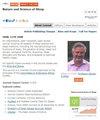Unveiling Coronasomnia: Pandemic Stress and Sleep Problems During the COVID-19 Outbreak
IF 3.4
2区 医学
Q2 CLINICAL NEUROLOGY
引用次数: 0
Abstract
Abstract: The COVID-19 pandemic posed an unprecedented challenge to public well-being, necessitating an examination of its health impact. This review discusses the relationship between pandemic-induced stressors and individual sleep patterns and quality. The pandemic stressors include lockdown or physical distancing measures, direct virus exposure, and the dissemination of misinformation and disinformation. The pandemic led to delayed sleep-wake cycles, except for healthcare professionals, and worsened sleep quality. The prevalence of insomnia was higher for women due to pre-existing conditions and susceptibility stressors such as lockdown stress and family responsibilities. Healthcare professionals, who experienced worsened work conditions during the pandemic, reported higher rates of insomnia and sleep difficulties due to infection anxiety and post-traumatic stress from direct virus exposure. For the general population, stress stemmed from social isolation under lockdown and overwhelming false information available online, resulting in sleep problems. Taken together, the findings highlight the importance of promoting social interactions, providing psychological support services, and caution in navigating health information. In summary, this review underscores the need for individual- and group-centered approaches in ongoing research and interventions to address pandemic-related stress and sleep issues during COVID-19.Keywords: sleep health, sleep disturbance, insomnia, infodemic
揭开冠状病毒失眠症的神秘面纱:COVID-19 爆发期间的流行性压力和睡眠问题
摘要:COVID-19 大流行病对公众福祉构成了前所未有的挑战,因此有必要研究其对健康的影响。本综述讨论了大流行引起的压力与个人睡眠模式和质量之间的关系。大流行压力源包括封锁或物理隔离措施、直接接触病毒以及传播错误信息和虚假信息。除医护人员外,大流行导致睡眠-觉醒周期推迟,睡眠质量下降。女性失眠的发生率更高,这是因为她们原有的疾病和易受影响的压力因素(如封锁压力和家庭责任)。医疗保健专业人员在大流行期间的工作条件恶化,由于感染焦虑和直接接触病毒造成的创伤后应激反应,失眠和睡眠困难的发生率较高。对于普通人来说,压力源于封锁下的社会隔离和网上铺天盖地的虚假信息,从而导致睡眠问题。综上所述,研究结果强调了促进社交互动、提供心理支持服务以及谨慎浏览健康信息的重要性。总之,本综述强调了在 COVID-19 期间,需要在正在进行的研究和干预中采用以个人和群体为中心的方法来解决与大流行相关的压力和睡眠问题。 关键词:睡眠健康 睡眠障碍 失眠 信息大流行
本文章由计算机程序翻译,如有差异,请以英文原文为准。
求助全文
约1分钟内获得全文
求助全文
来源期刊

Nature and Science of Sleep
Neuroscience-Behavioral Neuroscience
CiteScore
5.70
自引率
5.90%
发文量
245
审稿时长
16 weeks
期刊介绍:
Nature and Science of Sleep is an international, peer-reviewed, open access journal covering all aspects of sleep science and sleep medicine, including the neurophysiology and functions of sleep, the genetics of sleep, sleep and society, biological rhythms, dreaming, sleep disorders and therapy, and strategies to optimize healthy sleep.
Specific topics covered in the journal include:
The functions of sleep in humans and other animals
Physiological and neurophysiological changes with sleep
The genetics of sleep and sleep differences
The neurotransmitters, receptors and pathways involved in controlling both sleep and wakefulness
Behavioral and pharmacological interventions aimed at improving sleep, and improving wakefulness
Sleep changes with development and with age
Sleep and reproduction (e.g., changes across the menstrual cycle, with pregnancy and menopause)
The science and nature of dreams
Sleep disorders
Impact of sleep and sleep disorders on health, daytime function and quality of life
Sleep problems secondary to clinical disorders
Interaction of society with sleep (e.g., consequences of shift work, occupational health, public health)
The microbiome and sleep
Chronotherapy
Impact of circadian rhythms on sleep, physiology, cognition and health
Mechanisms controlling circadian rhythms, centrally and peripherally
Impact of circadian rhythm disruptions (including night shift work, jet lag and social jet lag) on sleep, physiology, cognition and health
Behavioral and pharmacological interventions aimed at reducing adverse effects of circadian-related sleep disruption
Assessment of technologies and biomarkers for measuring sleep and/or circadian rhythms
Epigenetic markers of sleep or circadian disruption.
 求助内容:
求助内容: 应助结果提醒方式:
应助结果提醒方式:


